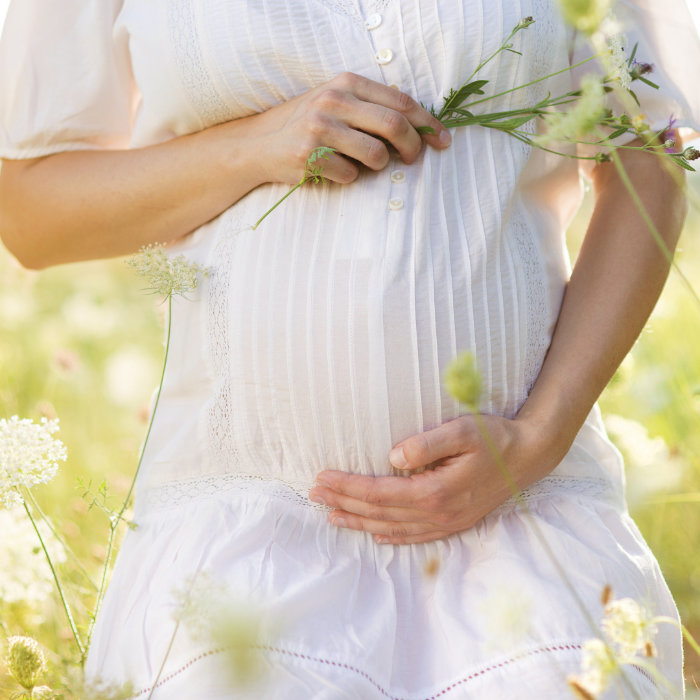
Whether you are trying for your first child or you’re looking to build that football team, nutrition and lifestyle can play a key role in optimising your ability to conceive. Whilst there are many factors involved, each partner can play a role in improving both their health and nutritional status, providing the best chance of conception.
Here nutritionist Laurann O’Reilly and owner of Nutrition By Laurann, discusses her key nutrition tips and lifestyle strategies for fertility.
1. Physical Activity: Exercise can play a key role as it can help to improve your blood flow in preparation for pregnancy. Even gentle exercises such swimming, walking, pregnancy yoga, and pilates are good choices. If you haven’t been doing much exercise prior to pregnancy, it may be best to start out slow and gentle. It may also be advisable to avoid any extreme sports or contact sports, however you can discuss with your GP what the best form of exercise is for you.
2. Stress Management: Stress in normal circumstances can play havoc with the body as it can have an impact on blood pressure. It also increases the stress hormone cortisol in the body which this can slow down our metabolic rate, increase our cravings of fatty and sugary foods and can cause the body to store more weight around the stomach (visceral obesity).
3. Foods To Include
- At least three servings of protein per day
- Six or more servings of whole grain foods per day
- Five or more servings of fruits and vegetables per day
- Three or more servings of dairy products per day
- Foods with essential fats
- Prenatal vitamins
4. Foods To Reduce/Avoid
- Alcohol
- Excessive caffeine
- Raw meats and seafood
- High-mercury fish
- Unpasteurised dairy
5. Watch The Sugar: It’s best to limit the amount of sugar and sweet foods you eat when trying to conceive as not alone can this contribute to weight gain, but studies have found that a diet rich in sugars and processed foods are associated with complications such as gestational diabetes, high blood pressure and can affect the health of the child (Nutrients Journal). Another study published in the American Journal of Clinical Nutrition found that the consumption of sugar sweetened beverages during pregnancy is associated with a higher BMI and fat mass in early childhood.
6. Vitamins & Minerals
- Calcium: Calcium is an important nutrient for the body in helping to build and maintain strong bones and teeth. During pregnancy, your calcium requirement may increase to support not only your health but that of your growing baby. Recommended Amount: In preparation for pregnancy and pregnancy 800mg/day (FSAI). Food Sources: Main sources include dairy products such as milk/cheese/yogurt/eggs, fish with the bones such as salmon, mackerel and sardines, broccoli, nuts and seeds (almonds, brazil nuts and hazelnuts), as well as products fortified with calcium such as plant milks, cereals and flours.
- Zinc: Is considered one of the most important nutrients for fertility. For women, zinc is needed to ensure production of healthy eggs, for uterine health and for regulation of hormones. For men, zinc is vital for sperm production as sufficient levels boost sperm count, motility and quality (SIMS IVF). Recommended Amount: Pre-Pregnancy 6.8mg/day, pregnancy (19-50 years) 9.5mg/day (FSAI). Food Sources: Include red meat, poultry, beans, nuts, whole grain foods, fortified breakfast cereals, seeds (pumpkin and sesame) and dairy products.
- Selenium: Selenium is another natural antioxidant which helps protect against chromosomal damage. It is best known for its critical role in sperm formation and motility. Selenium also plays an important role in female fertility, helping regulate thyroid and immune function, supporting the development of healthy follicles. It is important not to take too much selenium and to stay within the recommended amounts (SIMS IVF).
Recommended Amount: Pregnancy 49μg/day (FSAI). Food Sources: Include wholegrains/wheat germ, barley, oats, nuts (brazil and cashew nuts) garlic, pork, beef, poultry, fish, dairy products including milk, yogurt and eggs.
- Iron: Whilst iron hasn’t been proven to improve fertility it plays an important role in the delivery of oxygen around your body. Recommended Amount: During and in preparation for pregnancy you need 23 mg/day (FSAI), however it’s best to get your iron levels checked with your GP to ensure that you are meeting your requirement and to assess if you need supplementation. Food Sources: Sources include lean red meat, beans (such as red kidney beans, edamame beans and chickpeas), green leafy vegetables (such as spinach, kale and broccoli) and iron-fortified cereals.
- Vitamin C: Promotes healthy gums, teeth, bones, and helps your body absorb iron (which carries oxygen to our cells). In men Vitamin C helps protect sperm and improves sperm quality. Whilst in women with Polycystic Ovary Syndrome (PCOS) it can help to regulate their cycle (SIMS IVF). Recommended Amount: During and in preparation pregnancy you need 66 mg/day (FSAI). Food Sources: Include citrus fruits, peppers, spinach, berries, parsley, broccoli, Brussel sprouts, kiwi fruit, cauliflower, kale and red cabbage. Tip: As Vitamin C can be lost through cooking and processing, you can get the best benefits from raw or gently cooked fruit and vegetables.
- Vitamin E: Vitamin E a valuable antioxidant, works together with Vitamin C to protect egg and sperm quality and to enhance fertility. Please be aware that vitamin E has blood thinning properties and should not be taken in supplement form during IVF treatment where blood thinners are being used. (SIMS IVF). Recommended Amount: 12 mg/day.
Food Sources: Include sunflower seeds, wholegrains, avocados, tomatoes, almonds and other nuts, spinach and other green leafy vegetables,
- Vitamin D: Is important for the absorption of calcium in the body and to help maintain your bone health. Vitamin D is produced in the skin by exposure to the sun and optimum levels have been associated with improved sperm quality and quantity. For women, sufficient Vitamin D has been shown to help to maintain a healthy pregnancy and is associated with better IVF outcomes. Food sources contain small amounts of vitamin D, however due to the low level of sunshine in Ireland supplementation is often needed. It may be advisable to get your Vitamin D levels checked with your GP as excess vitamin D can be stored in the body (SIMS IVF). Recommended Amount: During and in preparation for pregnancy you need 10 μg/day in Vitamin D3 form (FSAI). Food Sources: Include oily fish (such as salmon, sardines, herring and mackerel), eggs, and fortified foods such as cereal and milk.
- The B Vitamins: The B-complex are a family of vitamins that are necessary to produce healthy genetic material in both the egg and sperm. All of the B vitamins are essential during the pre-conceptiono period and if supplementing, should ideally be taken as a complex, rather than individually (SIMS IVF).
- Vitamin B6: Helps form red blood cells and helps your body use protein, fat, and carbohydrates. Recommended Amount: During pregnancy you need 1.9 mg daily
Food Sources: Include beef, pork, whole-grain cereals, and bananas.
- Vitamin B12: Helps form red blood cells and maintains your nervous system. Recommended Amount: During pregnancy you need 2.6 micrograms daily
Food Sources: Include meat, fish, poultry and dairy products.
- Folate (Folic Acid): This B vitamin is important for the production of healthy red blood cells. It’s also known that folic acid can prevent neural tube defects so it’s essential before and during pregnancy. Also please be aware that certain medications or medical conditions may also increase your folic acid requirements so it’s best to consult your GP if you have any concerns. Recommended Amount: You must get at least 400 micrograms of folate daily before pregnancy and during the first 12 weeks of pregnancy to reduce the risk of neural tube defects. During pregnancy, doctors recommend you get 600 micrograms daily.
Food Sources: Include green leafy vegetables (broccoli, Brussels sprouts, cabbage, kale, spinach), peas, chickpeas, lentils, nuts and fortified foods.
- Omega 3 Fatty Acids: These essential fats play an important role in the production of healthy cells and in supporting immune and hormone function. They are also important for women with PCOS, helping insulin metabolism (SIMS IVF). Whilst in men, diets rich in anti-inflammatory omega-3 fatty acids have been shown to improve sperm health, quality and motility, whereas high intakes of saturated and trans fats adversely affect sperm quality (Nutrients Journal). Recommended Amount: Pre-Pregnancy 1750mg and in Pregnancy an additional 700-1400mg /day in EPH/DHA form (HSE Early Pregnancy Guidelines). Food Sources: Include oily fish (such as salmon, mackerel and sardines), include pumpkin seeds, chia seeds, walnuts and ground linseeds.
- CoQ10: Coenzyme Q10 is a vitamin-like substance that acts as an antioxidant, helping to protect cells from damage caused by normal everyday living and exacerbated by stress, pollution and nutrient deficiencies. A significant body of research shows it can help with sperm quality, quantity and motility and it is also believed to support egg quality, especially women over the age of 35 (SIMS IVF). It also pays an important role in maintaining energy levels, as it’s required for converting food energy into energy our body can use.
Recommended Amount: Research has found Pharma Nord's Bio-Quinone Active CoQ10 Gold to be effective at 200mg/day (Giannubilo Study). Food Sources: Include oily fish (see above) and wholegrain foods.
7. Supplementation Guidance: If you do take a supplement, always check that it is suitable for use while trying to conceive as some nutrients such as vitamin A are not recommended above specific levels during this period. Always inform your doctor of any nutritional supplements you are taking and avoid taking herbs while undergoing IVF treatment unless your doctor has agreed to this.
8. Stay Hydrated: Hydration pre and during pregnancy is important. This is of particular importance if you are losing fluids through morning sickness as you may become dehydrated. Try drinking decaffeinated tea and coffee and instead caffeinated drinks as much as possible. Requirement: Pre-pregnancy our adult fluid requirement is 35ml x your weight in kilos/day, once pregnant the recommended requirement is 2,300ml/day (EFSA).
For further information contact Laurann at info@nutritionbylaurann.ie or see www.nutritionbylaurann.ie
Laurann O’Reilly is a qualified and experienced Nutritionist with a BSc. Degree in Human Nutrition from University of Nottingham and a Master’s in Public Health Nutrition from University College Dublin.

A farmer’s daughter from Tipperary, Laurann has always had an appreciation for food, nutrition and health promotion.
Laurann has an honours BSc. Degree in Human Nutrition from the University of Nottingham and a Masters in Public Health Nutrition from University College Dublin. She is also an Associate Nutritionist with the Nutrition Society London.
With a passion for nutrition and experience working in Ireland and the UK, Laurann uses her knowledge and skills to help people achieve optimum health and assists in the prevention and treatment of nutritional related problems through means of nutritional consultation, personalised diet plans, health promotion and education.

Laurann has an Honours BSc. Degree in Human Nutrition from the University of Nottingham, a Masters in Public Health Nutrition from University College Dublin, is an Associate Nutritionist with the Nutrition Society London, a professional member of the Celiac Society Ireland, is registered with the Institute of Public Health Ireland and fully insured.
Dublin-Kildare-Tipperary